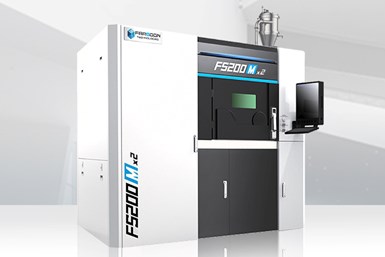Farsoon FS200M×2 System for Optimizing Productivity, Turnover Rates
The company says the printer is well suited for medium- to high-volume metal series production and prototypes.

Farsoon’s FS200M×2 platform. Photo Credit: Farsoon
Farsoon’s FS200M×2 platform is a medium-sized metal laser powder bed fusion (LPBF) printer developed to maximize additive manufacturing productivity and providing faster turnover rates. The printer is equipped with a build volume of 425 × 230 × 300 mm and a dual 500-W laser configuration.
The company says the printer is well suited for medium- to high-volume metal series production and prototypes, offering fast manufacturing turnovers rates, versatility and impressive ROI. The system is also said to provide cost-efficiency and ease of use for a wide range of industrial applications.
The company says the system is equipped with the dual-laser scanning technology and advanced calibration algorithms, offering one of the highest build volume rates in its class. The advanced calibration algorithms are said to precisely control both lasers’ operations, enabling an intelligent distribution of each laser’s up time for an overall improved build efficiency. The build platform also features a softened laser overlapping area for more uniformed part properties.
It is said the printer is an open platform, offering a high degree of control over the machine which enables precise tailoring of processing parameters. To improve the productivity even more, the machine is able to integrate multiple scanning strategies of different layer thickness in a single build according to the applications needs.
The printer is also equipped with an integrated, two-stage filter module, which features a back-flush function to ensure filter life and repeatable part quality. Depending on the material used, the secondary filtration system can last for approximately 1,500 hours, which can significantly help reduce the cost of filter changes. The advanced gas flow layout, as well as the unique recoater blade design helps achieve uniform part properties throughout the build platform.
As part of its quality control package, the FS200M×2 is equipped with in-chamber cameras which are used to monitor and record each layer. In addition to logging the layer-to-layer data, the cameras also enable Farsoon’s real-time recoat monitoring feature. This feature records and analyzes each recoat layer in real time. If a short feed or build error is detected, the software will automatically recoat or pause the build to ensure build quality.
Related Content
-
How Norsk Titanium Is Scaling Up AM Production — and Employment — in New York State
New opportunities for part production via the company’s forging-like additive process are coming from the aerospace industry as well as a different sector, the semiconductor industry.
-
Additive Manufacturing Is Subtractive, Too: How CNC Machining Integrates With AM (Includes Video)
For Keselowski Advanced Manufacturing, succeeding with laser powder bed fusion as a production process means developing a machine shop that is responsive to, and moves at the pacing of, metal 3D printing.
-
DMG MORI: Build Plate “Pucks” Cut Postprocessing Time by 80%
For spinal implants and other small 3D printed parts made through laser powder bed fusion, separate clampable units resting within the build plate provide for easy transfer to a CNC lathe.














